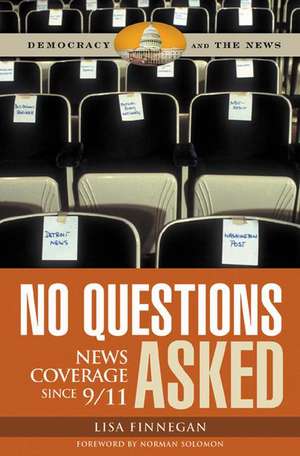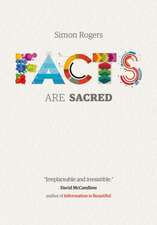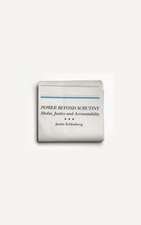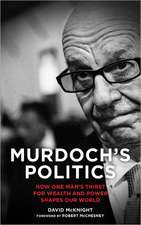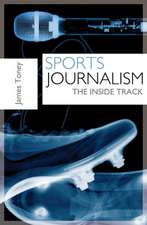No Questions Asked: News Coverage since 9/11: Democracy and the News
Autor Lisa Finneganen Limba Engleză Hardback – 29 noi 2006 – vârsta până la 17 ani
Preț: 321.44 lei
Preț vechi: 392.00 lei
-18% Nou
Puncte Express: 482
Preț estimativ în valută:
61.53€ • 66.85$ • 51.72£
61.53€ • 66.85$ • 51.72£
Carte tipărită la comandă
Livrare economică 21 aprilie-05 mai
Preluare comenzi: 021 569.72.76
Specificații
ISBN-13: 9780275993351
ISBN-10: 0275993353
Pagini: 216
Dimensiuni: 156 x 235 x 21 mm
Greutate: 0.49 kg
Editura: Bloomsbury Publishing
Colecția Praeger
Seria Democracy and the News
Locul publicării:New York, United States
ISBN-10: 0275993353
Pagini: 216
Dimensiuni: 156 x 235 x 21 mm
Greutate: 0.49 kg
Editura: Bloomsbury Publishing
Colecția Praeger
Seria Democracy and the News
Locul publicării:New York, United States
Notă biografică
Lisa Finnegan is an independent, award-winning journalist who has spent nearly two decades reporting for newspapers and magazines in the U.S. and abroad. After the 9/11 attacks she obtained a master's degree in educational psychology and began to focus on the psychology of terrorism and its impact on the media. She has published articles on the subject in professional journals and has spoken at conferences around the United States. She is an active member of the American Psychological Association.
Recenzii
Finnegan's convincing, readable, and meticulously researched book concerns the failure of the US press to adequately cover real news since the 9/11 attacks. Conservatives will probably accuse Finnegan (an award-winning journalist and a scholar of the psychology of terrorism and the media) of a liberal bias in maintaining that the Bush administration and Fox News bullied a compliant media into censoring key news stories and printing pro-administration propaganda pieces. But no one can deny that the alarming evidence Finnegan presents in support of that contention is well documented and raises questions that need to be asked. This book is more substantive than some other books on the subject (Bernard Goldberg's work comes to mind), many of which are underresearched and rancorous in their attempts to expose the media as liberal, and it is easier to read than David Barker's heavily footnoted, statistic-laden Rushed to Judgment (2002), which argues that the media are 6rnservative. Although the debate over whether the media is fundamentally left- or right-wing may never be settled, Finnegan addresses the controversy with a minimum of snarkiness and moral outrage and a preponderance of facts and intelligent analysis. Essential. All readers; all levels.
Finnegan's basic argument is that the American media have been largely responsible for such misperceptions because they have failed to maintain an independent, critical position in relation to 11 September, the war on terror, and the current Bush administration more generally. Her aim is thus to present examples of these failings, which she does to great effect by examining how various major American newspapers and television networks have covered news items ranging from the allied bombings of Afghanistan, to the effects of the USA Patriot Act (2001), to aspects of the war in Iraq..and on to the devastation of Hurricane Katrina..[T]he fact that she is able to build such a convincing argument about the malaise of media freedoms in America by drawing on reports from the media itself is testament to her skill in closely probing and contrasting particular media reports. It also shows that there are still flashes of good, critial life in the American media yet.
^INo Questions Asked: News Coverage Since 9/11^R is a clear-headed, methodical exposition on the medias failings since that fateful day..Finnegans unique perspective is that she approaches her subject matter as a journalist who earned a masters degree in educational psychology after the events of Sept. 11. But while the blending of these perspectives provides an academic frame for her understanding of the psychology of terrorism and how it affects the media, its Finnegans working knowledge of journalists and their group-think tendencies that enables her to connect the dots in so devastating a fashion. Reading ^INo Questions Asked^R is a sobering task, and one that should be required of any aspiring journalist before he or she takes on the mantle.
Many others have documented the press' letdown in fulfilling its adversarial role after 9/11. Seeing the problem is easy. Explaining it is harder. So Finnegan's rather studious approach, drawing on individual and group psychology, holds promise for not only understanding the failures but pointing toward reforms..Her suggestions boil down to detachment and determination: Ask hard questions, pursue documentation, seek comments outside the party line and follow up on loose ends and claims. It seems like pretty good psychology: Just use your head.
^INo Questions Asked: News Coverage since 9/11^R surveys the American media and its manipulation post-9/11, considering how the facts were misunderstood by the American public due to the lack of the right questions from reporters, and pinpointing mistruths about the war in Iraq and the nature of the threat of world terrorism. An eye-opening survey of democratic process and news reporting emerges which holds particular impact and importance for any college-level library strong in media studies.
With the passage of time, it has become more and more apparent how the American press failed to question the Bush administration response to 9/11 attacks on the U.S., according to independent journalist Finnegan, who explores those failures and what they may have cost the nation. Fear of being perceived as unpatriotic and willingness to accept information doled out by the administration led many journalists to retreat from their responsibility to question policies on the war on terror. The administration was not adequately probed on weapons of mass destruction in Iraq, the need to topple Saddam Hussein, and the Patriot Act and a host of other policies that have been set in place since 9/11. Finnegan describes the build-up to war and the psychological manipulation the administration used on the public and the press..This is a penetrating look at American news coverage at a critical time in U.S. history.
While many commentators have drawn connections between the miserably uncritical treatment of the Bush administration by the media following the September 11th attacks and the ability of the administration to initiate the invasion and occupation of Iraq based on nonexistent weapons of mass destruction and equally nonexistent ties between Saddam Hussein and Al Qaeda, fewer have sought to map out the entire American media landscape in the era of the War on Terror, as independent journalist Finnegan does here. The picture that emerges is, if anything, worse, with even the self-bestowed accolades for the media's coverage of Hurricane Katrina withering under scrutiny. Beyond criticizing the structural and cultural factors that preclude media skepticism towards the powerful, she also documents the many ways that the American media has come to serve essentially as a propaganda organ for government.
Finnegan's basic argument is that the American media have been largely responsible for such misperceptions because they have failed to maintain an independent, critical position in relation to 11 September, the war on terror, and the current Bush administration more generally. Her aim is thus to present examples of these failings, which she does to great effect by examining how various major American newspapers and television networks have covered news items ranging from the allied bombings of Afghanistan, to the effects of the USA Patriot Act (2001), to aspects of the war in Iraq..and on to the devastation of Hurricane Katrina..[T]he fact that she is able to build such a convincing argument about the malaise of media freedoms in America by drawing on reports from the media itself is testament to her skill in closely probing and contrasting particular media reports. It also shows that there are still flashes of good, critial life in the American media yet.
^INo Questions Asked: News Coverage Since 9/11^R is a clear-headed, methodical exposition on the medias failings since that fateful day..Finnegans unique perspective is that she approaches her subject matter as a journalist who earned a masters degree in educational psychology after the events of Sept. 11. But while the blending of these perspectives provides an academic frame for her understanding of the psychology of terrorism and how it affects the media, its Finnegans working knowledge of journalists and their group-think tendencies that enables her to connect the dots in so devastating a fashion. Reading ^INo Questions Asked^R is a sobering task, and one that should be required of any aspiring journalist before he or she takes on the mantle.
Many others have documented the press' letdown in fulfilling its adversarial role after 9/11. Seeing the problem is easy. Explaining it is harder. So Finnegan's rather studious approach, drawing on individual and group psychology, holds promise for not only understanding the failures but pointing toward reforms..Her suggestions boil down to detachment and determination: Ask hard questions, pursue documentation, seek comments outside the party line and follow up on loose ends and claims. It seems like pretty good psychology: Just use your head.
^INo Questions Asked: News Coverage since 9/11^R surveys the American media and its manipulation post-9/11, considering how the facts were misunderstood by the American public due to the lack of the right questions from reporters, and pinpointing mistruths about the war in Iraq and the nature of the threat of world terrorism. An eye-opening survey of democratic process and news reporting emerges which holds particular impact and importance for any college-level library strong in media studies.
With the passage of time, it has become more and more apparent how the American press failed to question the Bush administration response to 9/11 attacks on the U.S., according to independent journalist Finnegan, who explores those failures and what they may have cost the nation. Fear of being perceived as unpatriotic and willingness to accept information doled out by the administration led many journalists to retreat from their responsibility to question policies on the war on terror. The administration was not adequately probed on weapons of mass destruction in Iraq, the need to topple Saddam Hussein, and the Patriot Act and a host of other policies that have been set in place since 9/11. Finnegan describes the build-up to war and the psychological manipulation the administration used on the public and the press..This is a penetrating look at American news coverage at a critical time in U.S. history.
While many commentators have drawn connections between the miserably uncritical treatment of the Bush administration by the media following the September 11th attacks and the ability of the administration to initiate the invasion and occupation of Iraq based on nonexistent weapons of mass destruction and equally nonexistent ties between Saddam Hussein and Al Qaeda, fewer have sought to map out the entire American media landscape in the era of the War on Terror, as independent journalist Finnegan does here. The picture that emerges is, if anything, worse, with even the self-bestowed accolades for the media's coverage of Hurricane Katrina withering under scrutiny. Beyond criticizing the structural and cultural factors that preclude media skepticism towards the powerful, she also documents the many ways that the American media has come to serve essentially as a propaganda organ for government.
